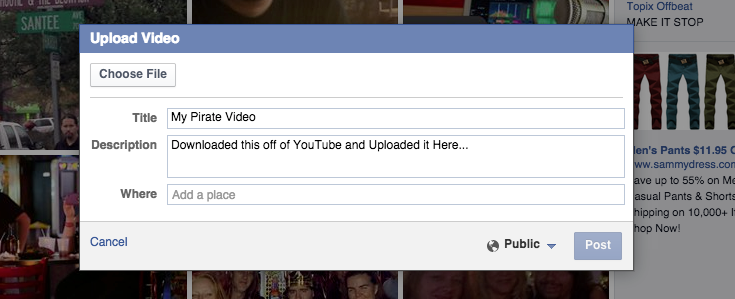How Facebook Encourages Video Piracy
 Musician turned actor Tyrese Gibson has found himself at the center of an Internet controversy.
Musician turned actor Tyrese Gibson has found himself at the center of an Internet controversy.
A recent article on The Verge asked its readers not to share his posts on Facebook because, “Tyrese Gibson is lifting the Internet’s most viral videos for fame and fortune.” That sentiment has since been echoed by others, as concerns bout how the star achieved his social media success are growing.
The allegation is very straightforward. According to the Who Steals What Tumblr, Tyrese, along with countless other Facebook users, have been taking popular videos from YouTube (and other video sharing sites) and uploading them directly to Facebook, where they often get millions of views.
You can see a sample of this from Gibson’s page, where hepulled a video from Saturday Night Live’s YouTube channel and uploaded it on Facebook directly.
But Gibson is far from alone in this. As Who Steals What says, many others are doing the same including other celebrities, websites and even TV stations.
But why is there this epidemic of video theft on Facebook? In the age of embeds and easily-shared content, why would anyone even bother reuploading a video to Facebook? The answer is that Facebook is encouraging and rewarding users who upload videos to their platform and, in doing so, are also rewarding copyright infringement.
Facebook Vs. YouTube
 Facebook has become an increasingly important part of the social media strategy for almost everyone in business online, from small companies to huge corporations. However, Facebook has been reducing reach of pages and non-paid commercial posts as a means of trying to push users to pay for promoted posts and other advertising.
Facebook has become an increasingly important part of the social media strategy for almost everyone in business online, from small companies to huge corporations. However, Facebook has been reducing reach of pages and non-paid commercial posts as a means of trying to push users to pay for promoted posts and other advertising.
But while Facebook is definitely interested in advertising dollars, it’s also interested in having as much content as possible hosted on its site. After all, users who link outside of Facebook encourage others to spend less time on the site and limits Facebook’s ability to monetize the content that’s being shared on it.
To encourage this, Facebook has made changes to the way it displays video to strongly encourage users to upload to it rather than post links to YouTube. Those changes are obvious when you look at a side-by-side comparison video ads (featuring native Facebook content) to YouTube links.
It’s clear that YouTube gives much more space and visual appeal to videos hosted on its servers rather than links to YouTube, even though YouTube embeds make it possible to recreate the effect on both.
The goal of this was to encourage marketers to upload their videos to Facebook directly rather than or in addition to YouTube. However, the problem is that many of the most popular videos shared by marketers on Facebook are not original works, but interesting or popular clips found on other sites.
This strategy incentivizes those who don’t merely link to those videos, but rather, those who download them and reupload them to Facebook’s platform, usually without attribution or permission.
In short, this rewards those who infringe copyright and plagiarize over those who try to legitimate link to content. As much as Facebook says they discourage this kind of behavior, those who infringe are given more video plays, more shares, more likes and more interactions overall.
Those who share content in a more symbiotic way are having a very tough time competing.
Fixing the Problem
 Facbeook, with its size and audience, has a tremendous amount of clout over how its users behave. Much like Google with webmasters, when Facebook makes a change to its algorithm, its members are going to adjust their behavior to gain whatever edge they can.
Facbeook, with its size and audience, has a tremendous amount of clout over how its users behave. Much like Google with webmasters, when Facebook makes a change to its algorithm, its members are going to adjust their behavior to gain whatever edge they can.
Sometimes this power can be used for good. In recent weeks Google has been encouraging sites to ensure they are mobile-friendly or risk being demoted in search rankings. As a result, countless sites have optimized and honed their sites to work on mobile devices.
Facebook’s move, however, is much more selfish. They favor content uploaded to their site solely to encourage people to upload there in the first place. While this isn’t necessarily bad by itself, it is having the side effect of encouraging copyright infringement and plagiarism.
Facebook could fix this almost overnight by simply bringing video content from third parties into parity with content hosted on Facebook. This would be fairly trivial to do with most videos as they can be embedded perfectly legally. However, that would destroy the encouragement that such benefits provide.
As such, it’s unlikely that Facebook is going to step in and make this problem go away.
For right now, it’s up to a mixture of content creators and video hosting sites to try and blunt this issue.
First, YouTube can take steps to make it more difficult to download videos from its service. Currently there are dozens, if not hundreds, of sites where one can trivially download a video from YouTube. These sites have always been against YouTube’s Terms of Service, but YouTube has never taken much action against them.
But Facebook’s move changes the playing field. Not only is Facebook positioning itself as a potential video hosting competitor to YouTube, but it is doing so using a lot of YouTube’s most popular content. It may be time for YouTube to start taking steps to protect its users’ content and trying to prevent unlawful downloads.
Video content creators also need to be aware of these issues and, when they discover such misuse of their videos, take action. Facebook may be unwittingly encouraging plagiarism and copyright infringement, but they do have a strong copyright policy and remove infringing material when notified. They also ban repeat infringers.
If Facebook starts seeing a spike in copyright notices for videos uploaded, especially regarding popular pages, it may force the site to rethink it’s approach to online video.
But while all of this sounds great, there is one potential challenge that could drastically rewrite the legal landscape in this area and it comes from a major news organization.
The Fox News Fair Use Battle
 On September 11 of 2013, to commemorate the anniversary of the September 11 terrorist attacks, Fox news personality Jeanie Pirro posted an iconic photo of three firefighters raising an American flag over ground zero and juxtaposed it next to another iconic photo, the raising of the flag over Iwo Jima.
On September 11 of 2013, to commemorate the anniversary of the September 11 terrorist attacks, Fox news personality Jeanie Pirro posted an iconic photo of three firefighters raising an American flag over ground zero and juxtaposed it next to another iconic photo, the raising of the flag over Iwo Jima.
However, the 9/11 photograph is owned by New Jersey Media Group, whose photographer snapped the image. They sued Fox News saying that the use without a license was an infringement but Fox News has hit back, claiming that the use of the photo was as fair use.
In their pleadings, Fox has argued that the posting to social media is almost always a fair use:
“Expression on social media, and on Facebook in particular, is thus inherently intertwined with ‘comment’ and ‘criticism,’ purposes that the Copyright Act sets forth as presumptively fair.
Fox was denied a summary judgment on this argument but the judge nor a jury has truly addressed it. Still, if Fox’s argument wins the day, then posting almost any copyrighted material on Facebook could be seen as a likely fair use, making it difficult to remove.
Theoretically, this could apply just as easily to videos as it does photos, making it perfectly legal for a user to download a video from YouTube and upload it to Facebook just because it opens it up to commentary and criticism on social media.
To be clear, I don’t think this argument has a high likelihood of success. While Fox’s use of the photo may be a fair use, it isn’t because social media is inherently a fair use. If it passes fair use muster, it will almost certainly be because of the facts related to that particular use.
Still, as more and more content creators begin to look at how their work is used on Facebook, often without permission or attribution and for commercial or promotional accounts, this is definitely a case to watch.
Bottom Line
When Facebook made the decision to give preferential treatment to videos hosted with them over those on YouTube, I doubt they did so with the intent of promoting infringement and plagiarism. It was most like a combination of wanting to promote their products combined with technical and possible terms of service challenges.
However, the results of their actions are beyond debate. Many pages, including some that are very popular, have been taking advantage of these benefits not by uploading original content, but by re-uploading content from others, attribution and permission be dammed.
This not only harms legitimate creators, depriving them of views and the ability to monetize their newfound attention, but it also creates a culture that I don’t think Facebook wants, a culture of infringement rather than a culture of sharing.
Facebook has to realize that even small changes can have major impacts on how users take advantage of their site. They also have to realize that, being a good member of the digital community means making sacrifices and working with those who might be seen as your competitor.
Until Facebook realizes this, YouTube and its creators are on their own, watching as their videos get millions of views, none of which actually benefit them in any way.
Want to Reuse or Republish this Content?
If you want to feature this article in your site, classroom or elsewhere, just let us know! We usually grant permission within 24 hours.
